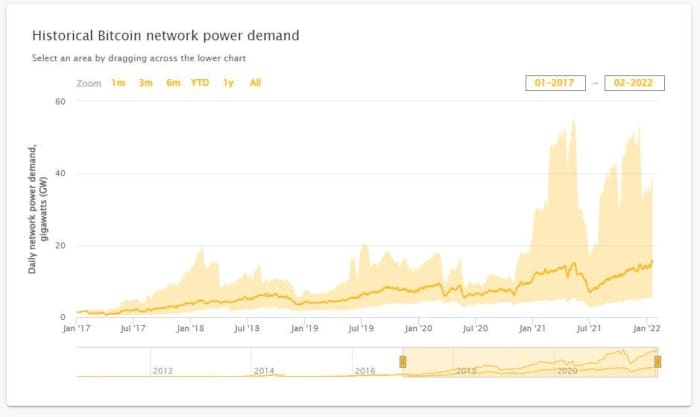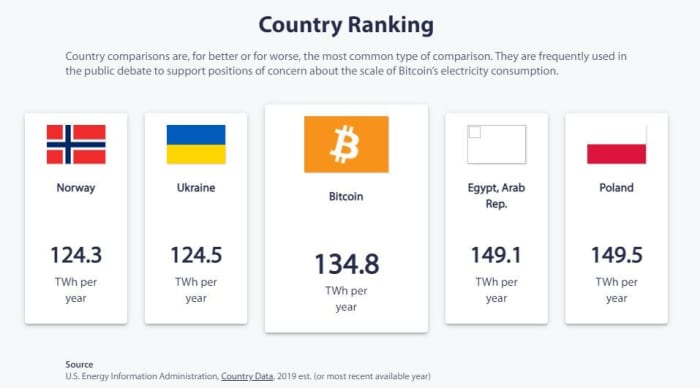This post was originally published on this site
The European Union urgently needs to ban a form of cryptocurrency mining that is relying heavily on renewable energy, and poses a threat to climate-change goals, a top regional regulator said Wednesday.
“The solution is to ban ‘proof of work’,” Erik Thedéen, vice-chair of the European Securities and Markets Authority, told the Financial Times in an interview.
He was referring one the main methods of verifying cryptocurrency transactions, which has been criticized as consuming too much energy as it uses a competitive method of confirming transactions, involving many miners who try to solve cryptographic puzzles. The alternate, newer “proof of stake” model uses fewer, randomly selected miners.
“Proof of stake has a significantly lower energy profile,” said Thedéen, who added that in his native Sweden, where authorities have found an increasing amount of cryptocurrency mining was using renewable energy. “We need to have a discussion about shifting the industry to a more efficient technology,” he said.
China banned cryptocurrency activity including mining last year, citing reasons from money laundering to environmental and energy problems. Swedish authorities, meanwhile, called for a halt to “energy-intensive mining of crypto assets” last November, saying it threatened the country’s ability to meet Paris Agreement goals.
“Bitcoin is now a national issue for Sweden because of the amount of renewable energy devoted to mining,” Thedéen said.
Bitcoin
BTCUSD,
electricity consumption has surged during the pandemic years, according to this chart from the Cambridge bitcoin Electricity Consumption Index.

University of Cambridge Business School
Its electricity consumption alone can dwarf that of single countries, by some measurements, as shown by another Cambridge chart.

University of Cambridge
Though Cambridge points out that “country comparisons without additional context provide only limited insight given the huge disparities between nations.”
Read more here.
The European Parliament has proposed a requirement for companies to disclose crypto-related energy consumption, while the Crypto Climate Accord is a private-sector attempt to address the issue.
Jad Comair, founder and CEO of Melanion Capital, pushed back against the Swedish regulator’s claims, in an email to MarketWatch. Melanion Capital is a French-based asset manager that last year launched a bitcoin themed exchange-traded fund in Europe — Melanion BTC Equities Universe UCITS ETF.
“It is sad to see once again policy makers and officials call for such uninformed decisions, which penalize an industry that could be key to enabling the energy transition in the European Union,” said Comair, adding that Thedéen’s comments show a “lack of understanding of bitcoin,” and Europe’s electricity mix.
“Bitcoin mining uses an inconsequential amount of energy — bitcoin mining is rapidly becoming more efficient and greener,” said Comair, adding that it’s the industry with the “highest clean energy mix. “
“The European energy problem is mainly driven by an inefficient grid design and distribution that leads to electricity prices surging in some regions and very low to others, where bitcoin miners tend to connect,” he said.
Read: Here’s how many Visa transactions can be completed using the energy to mine one bitcoin
Comair suggested Thedéen read Melanion’s latest bitcoin transition research “that showcases Bitcoin’s sustainability by addressing the problem from a Sustainable Development Goals, as set by the United Nations in 2015.”
Europe has struggled over the past year particularly with power shortages that have required the use of more traditional and dirtier fuels to at times. Surging prices weighed on consumers and companies last year and have threatened to continue into this year, with governments spending billions to provide relief.

